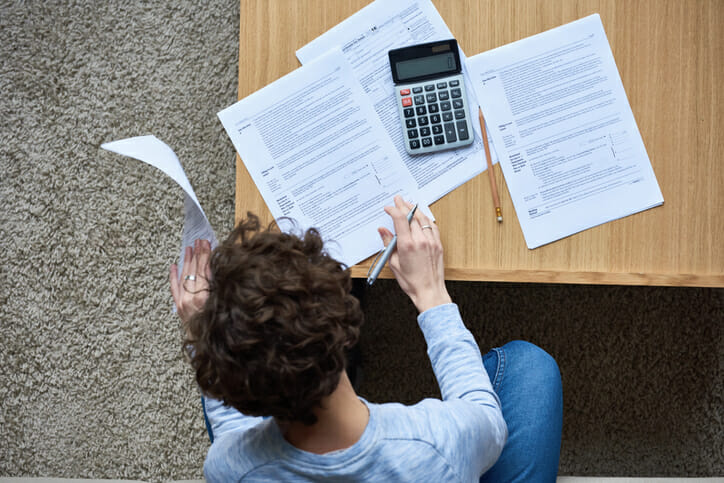How To Get The Most Back On Taxes

Want to get a big tax refund this tax filing season? You can minimize your tax liability, and potentially snag a larger refund, by taking advantage of every possible tax break. In this article we'll discuss a few strategies to keep in mind as you look to get the biggest refund possible. Keep in mind, though, that if you want to go beyond this year's tax refund and minimize taxes on your long-term financial plan, your best bet is to find a financial advisor. Here's are four ways to get a bigger tax refund.
Get a Bigger Tax Refund: Consider Your Filing Status
Your filing status can have a significant impact on your tax refund, regardless of whether you're single or married. For most married couples, it makes sense to file jointly. However, there are some situations where you should consider filing separately.
For example, if you or your spouse has a significant amount of medical or business expenses, filing separately may reduce your adjusted gross income and increase the amount you can deduct (because these deductions can only be taken if they exceed a given percentage of your income). On the other hand, filing separately means you may miss out on some key tax credits. Run the numbers to see which filing status yields the bigger benefit. And if math isn't your forte, you can estimate your return easily with a free tax return calculator.
If you're single, you could look into whether you qualify for head of household status. Generally, you need to have paid more than half the cost of maintaining a household for yourself and a qualifying dependent over the course of the year. For tax purposes, this could mean a child or a dependent adult, including an aging parent. If you're able to file as head of household it could give your refund a significant boost. For example, heads of household get a larger standard deduction than single filers.
Get a Bigger Tax Refund: Claim Your Credits

A tax credit reduces the amount of tax you owe to the IRS on a dollar-for-dollar basis. For example, if you owe $6,000 in taxes and claim a credit worth $1,000, your bill drops to $5,000. Certain credits may even be refundable, which means you can claim them even if you don't have any tax liability.
Some of the most common tax credits include the Earned Income Tax Credit (claim up to $6,728 for three or more qualifying children in tax year 2021), the Child and Dependent Care Credit (up to $4,000 $8,000 for two or more qualifying persons in tax year 2021), the Child Tax Credit (expanded up to $3,600 per qualifying child in tax year 2021) and tax credits for education expenses. Your eligibility to claim these and other tax credits typically depends on your income, filing status and whether or not you have eligible dependents. For credits related to education expenses, there are additional guidelines regarding when you can claim them and which expenses qualify.
You may also earn credits for making certain energy efficient improvements to your home. There is also the Premium Tax Credit which can offset some of the cost of premiums for insurance you buy through the federal health care exchange.
Get a Bigger Tax Refund: Don't Forget the Deductions
In terms of your tax refund, credits typically yield a bigger tax return than deductions. But that doesn't mean you should overlook key write-offs you qualify for. Instead of reducing the amount of tax you owe, deductions reduce the amount of income that is subject to tax.
When you file your taxes, you have to decide whether to take the standard deduction or itemize. For many filers, the Trump tax plan's doubling of the standard deduction has made this choice an easy one. However, itemizing becomes the smarter choice when you have a lot of deductible expenses. This includes business expenses such as mileage and lodging, home office expenses if you're self-employed, donations to charitable organizations, mortgage interest, student loan interest and even gambling losses.
The amount of each expense you can deduct does vary. It's also important to make sure you have appropriate records to backup your claim, like receipts or bank statements.
Get a Bigger Tax Refund: Max Out Your IRA

Setting aside money in a traditional IRA is a great way to build your nest egg and score an additional tax bonus. You can fund your IRA for the previous tax year right up to the April filing deadline and your contributions may be partially or fully deductible. It's an above-the-line deduction, which means you can take the deduction even if you're not itemizing.
You may also be able to claim a tax credit for your contributions. The Retirement Saver's Credit applies to contributions to both traditional and Roth IRAs, but you have to meet specific income guidelines to qualify.
When it comes to filing your taxes, every penny counts, especially when you're trying to beef up your tax refund. The more you know about which tax benefits you qualify for, the more money you'll be able to put in your pocket.
Bottom Line
There are ways to boost the tax refund you get back from the government. It's all about optimizing your deductions, claims and credits. Even your filing status can get you a bigger refund. If you're really trying to get the biggest refund you can, make sure that you use the best tax filing software you can. A good tax service will help you get every deduction and credit that you qualify for. It will also guide you through the process so that you don't have to feel lost or confused as you work through your return.
Tax Planning Tips
- You might also want to use your refund to start investing. A financial advisor can guide you on how to invest in a tax-efficient manner. SmartAsset's free tool matches you with up to three financial advisors in your area, and you can interview your advisor matches at no cost to decide which one is right for you. If you're ready to find an advisor who can help you achieve your financial goals, get started now.
- A third alternative is putting those funds into a savings account immediately, avoiding the urge to spend it instead. This allows your money to grow inside an FDIC-insured account. This offers an ideal way to save towards a savings goal or to simply build an emergency fund.
Photo credit: ©iStock.com/AntonioGuillem, ©iStock.com/mediaphotos, ©iStock.com/PeopleImages
Rebecca Lake Rebecca Lake is a retirement, investing and estate planning expert who has been writing about personal finance for a decade. Her expertise in the finance niche also extends to home buying, credit cards, banking and small business. She's worked directly with several major financial and insurance brands, including Citibank, Discover and AIG and her writing has appeared online at U.S. News and World Report, CreditCards.com and Investopedia. Rebecca is a graduate of the University of South Carolina and she also attended Charleston Southern University as a graduate student. Originally from central Virginia, she now lives on the North Carolina coast along with her two children.
How To Get The Most Back On Taxes
Source: https://smartasset.com/taxes/how-to-get-bigger-tax-refund
Posted by: lewisgoicame.blogspot.com

0 Response to "How To Get The Most Back On Taxes"
Post a Comment